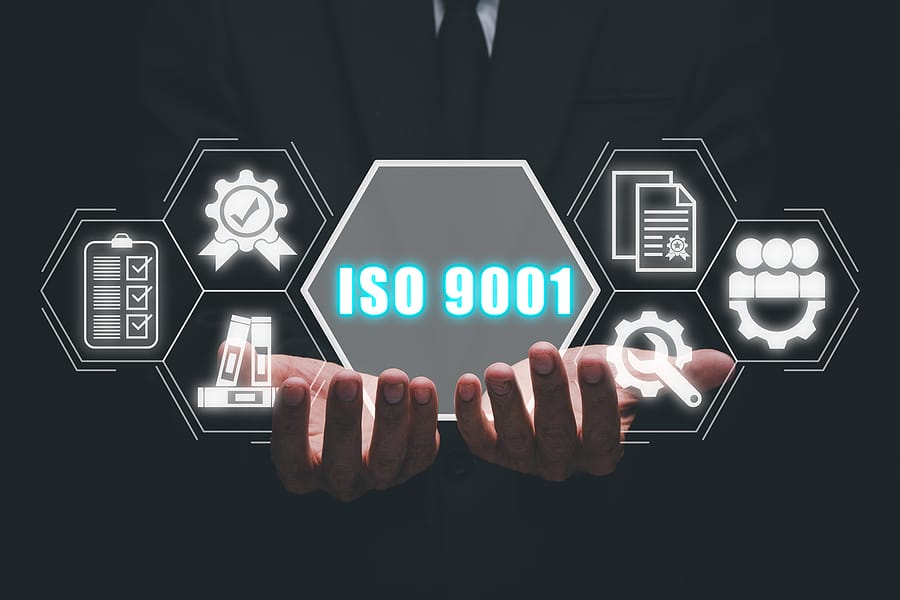Application
Begin the ISO 9001:2015 certification process by submitting an application to a recognized certification body. Include details about your organization, its scope, and any relevant information.
Quality management systems
Quality Management Systems

ISO 9001 sets criteria for Quality Management Systems (QMS) ensuring consistent customer satisfaction. Key principles include customer focus, leadership, engagement of people, process approach, evidence-based decision making, and continual improvement. Benefits include enhanced credibility, customer satisfaction, and operational efficiency.
The fundamentals of ISO 9001 compliance, The key elements of an effective QMS, The purpose of ISO 9001 and the benefits of digitally optimized compliance, How proven software facilitates compliance with ISO 9001:2015.
Enhances customer satisfaction by ensuring consistent product or service quality.
Promotes a systematic approach to management, fostering efficiency and effectiveness.
Aligns processes with organizational goals, leading to improved overall business performance.
Establishes a framework for continuous improvement, enhancing product and service quality.
Streamlines processes, minimizes errors, and reduces waste, resulting in cost savings.
Demonstrates commitment to quality, attracting customers who value reliability and consistency.
Identifies and mitigates risks through a structured risk management approach, ensuring resilience in the face of challenges.
Begin the ISO 9001:2015 certification process by submitting an application to a recognized certification body. Include details about your organization, its scope, and any relevant information.
Following the application, receive a comprehensive offer from the certification body outlining the costs, schedule, and terms associated with the certification process.
After reviewing the offer, formally accept the terms to proceed with the certification process. This acceptance signals the initiation of the audit and evaluation phase.
Undergo a thorough audit conducted by certified auditors to assess your organization's adherence to ISO 9001:2015 standards. This involves examining processes, documentation, and overall quality management systems.
Upon successful completion of the audit, the certification body reviews the findings and decides whether to grant ISO 9001:2015 certification. A positive outcome results in the issuance of the certification.
Maintain your ISO 9001:2015 certification by undergoing regular surveillance audits. These periodic assessments ensure ongoing compliance and continuous improvement within your organization.
Leadership
Planning
Support
Operation
Improvement
ISO 9001:2015 Certificate, a universally acknowledged quality management standard, aids organizations in enhancing performance, meeting customer needs, and showcasing dedication to quality. Its guidelines outline the establishment, maintenance, and improvement of a Quality Management System (QMS). Implementing ISO 9001 ensures efficient processes and skilled staff for consistent delivery of impeccable products or services.
ISO 9001, the most prevalent quality management standard globally, boasts over one million certifications across 189 countries. It stands out within the ISO 9000 family for its emphasis on customer focus and continuous improvement, being the sole certifiable standard (though certification is optional).
These are indeed significant business benefits associated with implementing ISO 9001: 2015 Certificates:
Customer Confidence: ISO 9001 certification demonstrates to customers that an organization is committed to quality and has established processes to ensure consistent delivery of products or services. This can enhance customer trust and satisfaction, leading to increased loyalty and repeat business.
Effective Complaint Resolution: ISO 9001 provides a framework for addressing customer complaints promptly and effectively. By following standardized procedures for handling complaints, organizations can improve customer relations and mitigate potential negative impacts on their reputation.
Process Improvement: Implementing ISO 9001 necessitates a thorough evaluation of existing processes, leading to the identification of inefficiencies and areas for improvement. By optimizing processes, organizations can enhance productivity, reduce waste, and ultimately improve their bottom line.
Ongoing Optimization: ISO 9001 promotes a culture of continuous improvement through regular audits, reviews, and corrective actions. By continually assessing and refining their quality management systems, organizations can adapt to changing market conditions, remain competitive, and sustain long-term success.
Any organization that wants to improve its quality management system, meet customer and applicable statutory and regulatory requirements, and enhance customer satisfaction can use the ISO 9001 standard. It is suitable for organizations of any size, and applies to all sectors, including manufacturing, services, healthcare, education, government, and non-profit organizations. ISO 9001 can also be used by certification bodies or other third parties to assess an organization’s conformity with this International Standard.
ISO has a range of standards for quality management systems that are based on ISO 9001 and adapted to specific sectors and industries. These include:
Automotive Industry: ISO/TS 16949 (now IATF 16949) is used, which is based on ISO 9001 with additional automotive sector-specific requirements.
Aerospace Industry: AS9100 is utilized, which aligns with ISO 9001 but includes aerospace sector-specific requirements.
Medical Devices Industry: ISO 13485 is prevalent, incorporating ISO 9001 principles with additional requirements specific to medical devices.
Food Industry: ISO 22000 is commonly adopted, focusing on food safety management systems and integrating ISO 9001 principles.
If you're seeking standards specific to your sector, you should look into the relevant standards organizations or industry associations that cater to your industry. They often provide guidance and standards tailored to your sector's needs, built upon the foundation of ISO 9001:2015 certificate.
ISO 9001 is a comprehensive standard that outlines the requirements for implementing and maintaining a quality management system (QMS). It covers various topics related to quality management, including:
Scope: Defining the scope of the quality management system within the organization.
Normative References: Referring to other standards that are applicable for the QMS.
Terms and Definitions: Providing definitions of key terms used in the standard to ensure common understanding.
Context of the Organization: Understanding the organization and its context, including internal and external factors that can influence the QMS.
Leadership: Requirements for top management's commitment, leadership, and accountability in establishing and maintaining the QMS.
Planning: Planning for the QMS, including identifying risks and opportunities, setting quality objectives, and planning for changes.
Support: Providing the necessary resources, including human resources, infrastructure, and environment, to support the QMS.
Operation: Implementing the planned processes and controls to meet quality objectives and customer requirements.
Performance Evaluation: Monitoring, measuring, analyzing, and evaluating the QMS processes and performance.
Improvement: Taking corrective and preventive actions to address nonconformities and continually improve the effectiveness of the QMS.
These topics are organized into several clauses in the ISO 9001 standard document. Implementing ISO 9001 helps organizations to ensure consistency in their processes, enhance customer satisfaction, and continually improve their performance.
At Legal Certificate Solution, we specialize in facilitating ISO certifications that meet rigorous global quality standards. Our expertise extends to guiding clients through successful ISO audits and ensuring efficient acquisition of subsequent certification services
ISO certifications in India are granted by certification bodies accredited by either the National Accreditation Board for Certification Bodies (NABCB) or the Quality Council of India (QCI). These bodies are mandated to adhere to the stringent requirements and guidelines established by the International Organization for Standardization (ISO).
As one of the oldest non-governmental international organizations, ISO has enabled trade and cooperation between people and companies the world over since 1946. The International Standards published by ISO serve to make lives easier, safer and better.
ISO is an independent, non-governmental organization made up of members from the national standards bodies of 170 countries. Our members play a vital role in how we operate, meeting once a year for a General Assembly that decides our strategic objectives.
Around the globe, 2.1 million companies hold ISO 9001 certification, spanning over 170 countries. These certifications are regularly updated to incorporate the most current best practices in quality management. It's important to note that ISO 9001 certification is voluntary, and companies are not obliged to pursue it.
ISO 9001: Global quality standard for orgs. Improves performance, meets customer expectations, shows commitment to quality. Defines QMS establishment, implementation, maintenance, continual improvement. Ensures flawless products/services through effective processes & trained staff.



